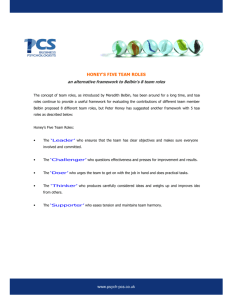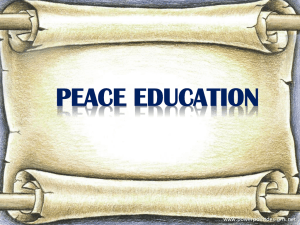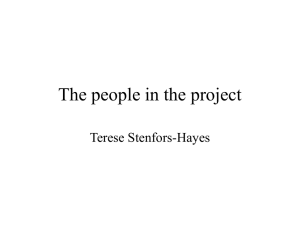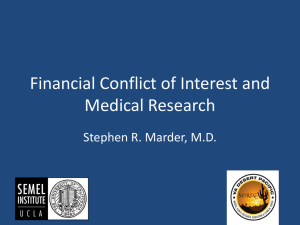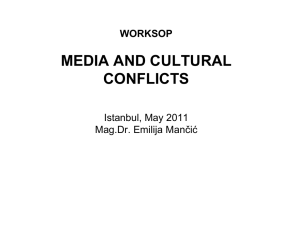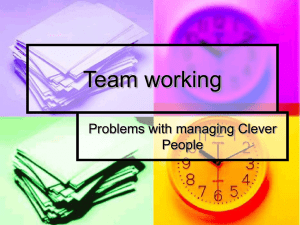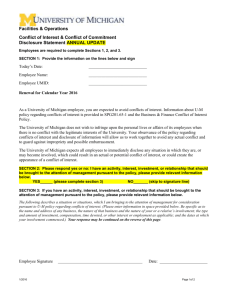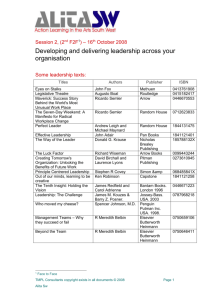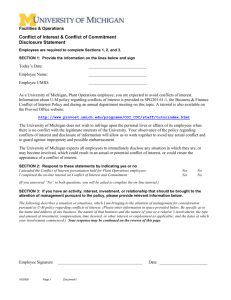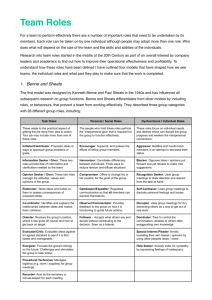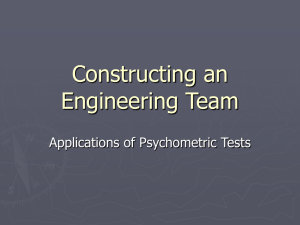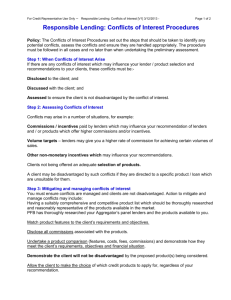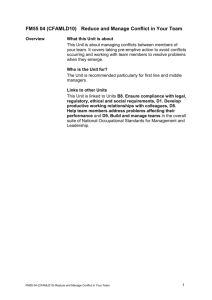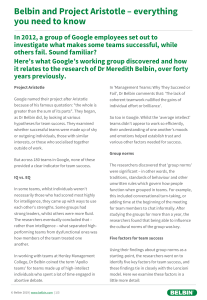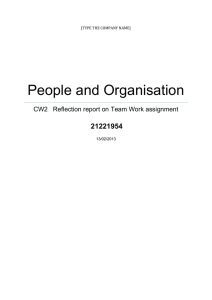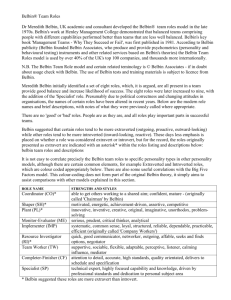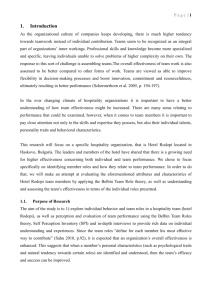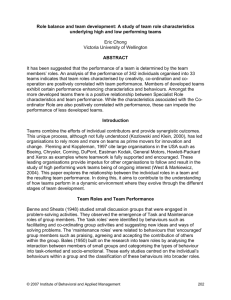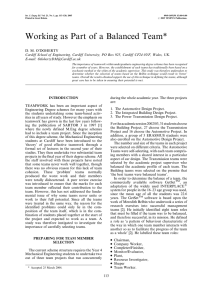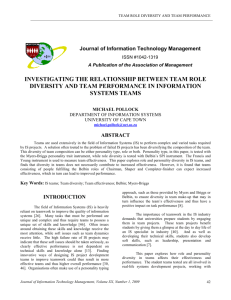Team Charter Edited
advertisement
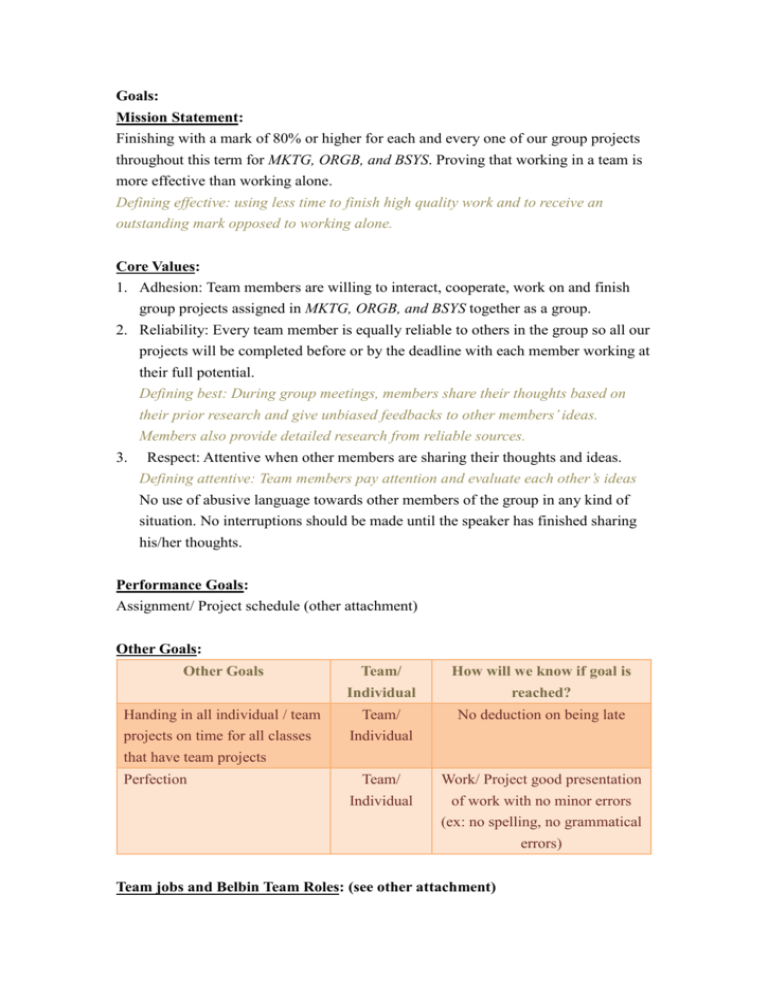
Goals: Mission Statement: Finishing with a mark of 80% or higher for each and every one of our group projects throughout this term for MKTG, ORGB, and BSYS. Proving that working in a team is more effective than working alone. Defining effective: using less time to finish high quality work and to receive an outstanding mark opposed to working alone. Core Values: 1. Adhesion: Team members are willing to interact, cooperate, work on and finish group projects assigned in MKTG, ORGB, and BSYS together as a group. 2. Reliability: Every team member is equally reliable to others in the group so all our projects will be completed before or by the deadline with each member working at their full potential. Defining best: During group meetings, members share their thoughts based on their prior research and give unbiased feedbacks to other members’ ideas. Members also provide detailed research from reliable sources. 3. Respect: Attentive when other members are sharing their thoughts and ideas. Defining attentive: Team members pay attention and evaluate each other’s ideas No use of abusive language towards other members of the group in any kind of situation. No interruptions should be made until the speaker has finished sharing his/her thoughts. Performance Goals: Assignment/ Project schedule (other attachment) Other Goals: Other Goals Team/ Individual How will we know if goal is reached? Handing in all individual / team Team/ No deduction on being late projects on time for all classes that have team projects Individual Perfection Team/ Individual Work/ Project good presentation of work with no minor errors (ex: no spelling, no grammatical errors) Team jobs and Belbin Team Roles: (see other attachment) Due to the result of a disperse distribution in Belbin team Roles, we will not be using Belbin Team Roles as a main factor when deciding roles for the team. Roles will be temporarily fixed until one or more members feel a need to rotate their roles. (Feel that they want to experience a change in their roles; feel that they are not capable of doing the role they are in right now; feels that another member’s role is too easy compared to the rest…etc-). Roles will be reassigned through an extra in-person or online group discussion before another group project begins. Roles will not be altered until the current project is finished. Team Norms and Ground Rules: Communication: Will take place generally through Whatsapp and text messages. Phones will be used only if we cannot contact the team member via Whatsapp or text messages. Skype might also be used if necessary. The project manager (default: Abie) will be responsible for communication. Frequency of communication varies depending on the progress of projects. Expectation: To improve group efficiency, team members are expected to stay on task AND on topic during group meetings/discussions. Team members are expected to share their ideas during meetings, so preparations such as research should be done beforehand. Members should be on time for group meetings unless excused beforehand or calls ahead letting at least one other team member know. If they cannot attend a meeting, he/she will have to inform ideally two team members as soon as he/she realizes they’re unable to attend. Task Distribution: Roughly equal amount of work will be distributed to each member of the team often by team members choosing which section they feel they can excel at. (More specifically: when there are less than 6 sections of the project that needs to be done, sections that requires more work will be spitted so that everyone receives a section to work on. When there are exactly 6 sections that require approximately same amount of work, the work load will be distributed equally among members. When there are more than 6 sections on a project, some sections will be combined to ensure everyone gets roughly the same amount of work. Scheduling: Draft schedules will be made by the time- keeper. The draft schedule will then be reviewed by the facilitator. If a team member’s personal schedule conflicts with the project schedule, that specific team member can always request a revise on the schedule to resolve the conflict. (If necessary, revised) schedule will then be handed out/ sent to every member of the team. Progresses of task made should be in line with schedule that has been planned. Decision making: Decision will be made as a group during group discussions. Majority rules unless presented with a reasonable explanation and can convince the rest of the team to choose otherwise Disagreements and conflicts resolution: Team members must be willing to discuss and compromise in any kind of conflicts. Members are expected to state their point of view of a specific problem they feel exists in a professional manner. Abusive language is strictly forbidden. Members are expected to remain seated until the problem is resolved. MEMBERS CANNOT ABANDON THE WORK THAT THEY’RE ASSIGNED DUE TO FRUSTRATION AT ANOTHER MEMBER OR TEAM. (Members cannot rush out the room because of frustration without coming back to the meeting. However, team members are allowed to have a break, go outside to calm down if they cannot handle their emotions throughout the discussion). When conflicts arise, the rest of the members will have to listen to both sides’ opinion thoroughly and explain why they agree with one of the member’s decision. Again, majority rules. For conflicts over quality of work, level of effort of a specific member, who does what, the team decides as whole. All decisions made by the team is to look out for the team, not one specific member. Defining detailed discussions: why is that specific member not able to provide high- quality work to the group, not putting effort in his/ her work? What can be done to improve the situation they are at right now?) As a last resort if all goes wrong the team will: Inform the instructor our team can no longer function as a whole
